- Home
- Bette Lee Crosby
The Twelfth Child Page 5
The Twelfth Child Read online
Page 5
As the days drifted into February, Abigail developed the ability to be elsewhere as she worked. She would appear to be peeling potatoes or plucking frozen laundry from the clothesline, but inside her head she was riding horses and attending parties. She pictured a horse that was all her own, a black stallion with white markings, a horse named Thunder, so mighty that people took a deep breath and gasped as she climbed astride his back. She dreamed of taking the train to far away places such as Lynchburg and Alexandria and saw herself wearing a yellow hat with partridge feathers as she marched into President Wilson’s office along with the other suffragette ladies. Yet, try as she might, Abigail couldn’t imagine the fair-haired girl breaking free of the snow globe.
In early March, Abigail Anne returned to school, despite William’s objections. He’d been of the opinion that seventh grade was plenty of schooling for girls, but when Miss Troy came to call with Preacher Broody, he pretty much backed off of that stance. He might not have been intimidated by Miss Troy, even though she was said to be the prettiest teacher in BlackburnCounty, but he was a God-fearing Methodist and wasn’t about to go against anything Preacher Broody said. Abigail hid in the pantry and listened to every word that was spoken.
It started off with William being right sociable, like this was just a friendly-come-to-call-visit. Then when Miss Troy said it was past time that both children returned to school, he got real huffy. “Who’s to say, when my girl goes to school?” he snapped.
“Every child deserves an education.” Judith Troy answered; her voice as calm and collected as someone commenting on the favorable weather.
Preacher Broody didn’t say much but even Abigail Anne, peering through a crack in the pantry door, could see how he kept his eyes fixed on Miss Judith’s pretty face.
“She already knows how to read and write,” William said, his voice bristling with rancor. “And, with Livonia gone, she’s got more chores to do.”
“She’s just a child!”
“She’s going on fourteen. I was only eleven when I started working the farm.”
“But, the world is changing,” Miss Troy argued, “Now-a-days children need to know more than just reading and writing.”
“Not for living on a farm, they don’t!”
“Abigail Anne might not want to be a farmer!” At this point, Judith Troy’s voice got sharper and she poked that little nose of hers out in a way that made Abigail Anne worry her papa would reach over and smack it good.
“She won’t be a farmer, but she’ll sure as hell marry up with one! You gonna educate her about caring for a family in that school of yours?”
“I’ll teach both of the children the ways of the world so that they can choose what they want to be. The time is coming when men will travel to cities and take on jobs that their fathers never dreamed of. And women…someday they’ll be able to stand shoulder-to-shoulder alongside of men. Don’t you want those things for your children?”
William stood so abruptly that his chair flew backward. “I sure as hell don’t!” he shouted. “I’m a Valley farmer and it’s a damn good life. If it’s good enough for me it’s sure as hell good enough for them!” William’s face was red as the noonday coals in the stove and Abigail Anne was certain if the preacher hadn’t been there, her daddy would have picked Miss Troy up and bodily tossed her out the door.
Preacher Broody must have known it also, because that’s when he started speaking up. “Now, William, there’s no call to get riled,” he said. “Miss Troy here is just trying to be helpful.”
“I don’t need help and neither does my kids.” William picked his chair up off the floor and sat back down at the table.
“There’s no way of knowing what God has in store for a body,” the preacher said. “Could be there’s some merit in what Miss Judith believes.”
William most always addressed the preacher with respect, but this time he looked him square in the eye and said, “Henry, I ain’t counting on the Lord to decide what’s in store for my kids. Will is gonna work this farm and Abigail Anne damn sight better be married off by time she’s sixteen.”
Just when Abigail Anne thought Miss Troy didn’t stand half-a-chance of changing her daddy’s mind, Preacher Broody hauled out his trump card. “The Lord takes a mighty dim view of such talk,” he said. “A closed mind is not the Christian way.”
Whereas he had been almost nose-to-nose with the preacher, William now slumped back in his chair. “I’m as God-fearing a Methodist as any,” he said, and that’s when the conversation took a turn for the better. Everybody’s tone of voice got a bit more easygoing and before the preacher and Miss Troy left the house, William had allowed that both children could attend school three days a week and Preacher Broody had indicated William’s name was sure to be on the list when the Congregation’s new Ministry Assistants were announced. In William’s mind, such an appointment practically meant a reserved spot in Heaven.
Still hidden back in the pantry, Abigail Anne grabbed hold of a sack of flour and kissed it as ardently as she would have kissed Miss Troy, if she’d had the opportunity.
The second Monday in March was blustery and cold, but to Abigail it felt like the most glorious of days as she and Will rode across the ridge road and off to Bush Creek. They were riding double on the back of Whisper, who was well past his prime, so by time they arrived most of the other children, including Cora Mae Callaghan, were already in their seats. Miss Troy stopped what she was doing when the twins entered the schoolhouse. “Welcome back,” she said. “We’ve missed you, haven’t we class?”
“Yes, Miss Troy,” everyone echoed.
Then Judith Troy walked over and hugged both children. Abigail Anne was certain she caught a whiff of the same Lavender Water Livonia always wore. The teacher was dressed in a brown wool skirt and a white blouse, but as Abigail watched throughout the day, she could envision Judith Troy in cloche hats, suffragette-type suits and rustling silk ball gowns. Once when Miss Troy touched the tip of her pencil to her chin, Abigail even pictured her smoking a cigarette.
That was when Abigail Anne first decided she wanted to be exactly like Judith Troy. She took to studying her movements, her smile, her tone of voice, the way she combed her hair and even the precise shade of lip rouge she used. Long before she turned fifteen, Abigail Anne had set her mind to becoming a teacher. Most times she could picture how she would look in wool skirts and crisp cotton blouses, hear herself speaking with Miss Troy’s rounded vowel tones, even feel the rumble of the train that would carry her off to far away cities, but sometimes in the middle of those thoughts, she’d hear the echo of her father’s words—better be married off before she turns sixteen.
Troubled Times
Destiny Fairchild always reminded me of the wild roses that sprang up along the south end of Chestnut Ridge every summer. In the dead of winter, when the snow on the plateau was as high as a man’s head, Mama would say “I don’t expect we’ll see any roses this year.” But a few months later there they’d be, millions of bright red buds twining their way along a row of split rail fences or shimmying up the sunny side of a chestnut tree. I always supposed God planted those roses so he could chuckle at the wonderment on folks’ faces when they passed by. I guess He also had a hand in bringing Destiny to Middleboro because, just like those roses, she cropped up out of nowhere and made folks feel happy. What kind of a mother would name a child Destiny I’d wonder; then I’d get to chuckling and have to admit it was pretty appropriate.
I wasn’t the only one who felt that way. Every time we’d go to the market, the clerks would call out, “Hi, Destiny!” They’d smile and wave from clear across the store, like they were real glad to see her. When we got home, there’d generally be an extra round of beef or package of fresh baked cookies in our bag. Once the butcher tucked in a twelve pound turkey! It was the same everywhere—the market, the gas station, the post office— people just seemed to take a liking to Destiny. That is, people other than Elliott. He only saw the girl a handful of
times, but right off took a dislike to her.
“She’s a fine neighbor,” I told Elliott. “I’m lucky to have her.”
“Oh, sure,” he said, with that condescending look where he raises one eyebrow and lets the rest of his face fall slack. “Her kind is out for what they can get from you.”
“She’s not asked for a dime!” I told him. I figured it would be better to leave it at that rather than reminding him of how he’d borrowed money on eight different occasions and never repaid a cent of it.
Other than Elliott’s snide comments, you never heard a bad word about Destiny – that is until her twenty-fifth birthday, a day when the child should have been celebrating with cake and ice cream, instead of sitting in a police station. Morgan Broadhurst, a genuinely dislikable District Attorney, perched a pair of snobby looking glasses on his big red nose and sneered at her as if she was some low-life white trash. “Miss Fairchild,” he warned, “you either give this investigation your utmost cooperation, or face charges on five counts of grand larceny, forgery, failure to…”
Grand larceny? Forgery? It was no such thing! I signed that car over to her, gave it up of my own free will! It hadn’t been driven since some time after Will died—four, maybe five, years ago. When her old Pinto finally gave out, I said, “Destiny, there’s a perfectly fine Buick sitting in my garage, you take it so we’ll have some way of getting back and forth to the market.” Granted, it was Destiny who filled out the papers and renewed the registration; but you’ve got to remember by that time my hand was real shaky and I couldn’t get around good as I once did. After she signed up for insurance, she polished and shined that car ‘till it looked brand new. She even went out and bought a Saint Christopher medal that was going to keep us safe. I suppose Saint Christopher was looking the other way when Elliott told Detective Nichols that Destiny had stolen the car and forged my name on the papers.
Elliott, who could always make worse of a situation, contrived a slew of accusations as to what Destiny had done; then he handed the detective a typed list of family heirlooms which, according to him, had been stolen. “And,” he said, “my great aunt’s silver tea service is missing as well.” He carried on like every one of those things were treasures of great sentimental value, but I knew what he was really after.
Detective Nichols read down the list of items. “Antique sewing cabinet, mahogany lamp tables, sterling silver ladle, cameo brooch…hmm. This is a pretty extensive list, you sure it’s all missing?”
The way Elliott carried on, anybody would have thought me richer than the Queen of England. The truth is, that so-called tea service was nothing more than a coated over piece of tin—why, I got it with six books of the green stamps they used to hand out at the Bountiful Basket. And the sewing cabinet belonged to my mama, it had a broken hinge and any number of scratches, it meant a lot to me but other than that it wasn’t worth a nickel; still, Elliott led the detective to believe it was something valuable. That was the way he was; he’d take some ordinary circumstance and blow it way out of proportion to fit his grandiose scheme of things.
“Oh, it’s all missing,” Elliott swore. “Every bit of it!”
It was hard to know for sure, but I thought the detective had a suspicious glint in his eye; he seemed a man well-acquainted with lying snakes.
“I’ve the suspicion,” Elliott said, “that if you searched the Fairchild woman’s house, you’d find it all—I know I’ve already seen her driving my great aunt’s car!”
“Destiny Fairchild? She’s the neighbor you spoke of?”
“Yes. I’ve only met the girl a few times, but right off I suspected she was out to swindle my poor aunt. I warned Aunt Abigail, but she was not one to listen.”
“This is a pretty serious accusation,” the detective said. “Are you certain you want to file a complaint?”
“Absolutely!” Elliott answered, “Absolutely!”
“Okay.” Detective Nichols eyed Elliott with a look that gave me reason think he doubted the truthfulness of the entire story. “Now,” he said, “let’s go through this from the start. Tell me what happened, as best you can recall.”
Lord God, I thought, the world has come to a sorry state when a thieving conniver such as Elliott is a person to be listened to. If Destiny had slammed the door in his face, that man wouldn’t know if I was dead or alive. Right then I started wishing Destiny had been called something else, like Lucky or Happy, some more positive name that didn’t leave such an open-ended issue of her future.
I still remember the day I first met Elliott; it was back in nineteen-eighty-six, two years after Will sold the farm and moved to Culpepper. Dear sweet Becky was still alive then and she was the one who telephoned and invited me to Sunday dinner. “Will wants you to come over to meet this Elliott person,” she said. “Supposedly his grandma was a descendant of the Lannigan family.” I caught on to that supposedly and right away knew Becky had certain suspicions. Will’s wife was a good woman, down-to-earth as they come, but at times she could be a bit priggish if a person didn’t strike her just so. “Okay,” I answered, “but I’ll want to start back early.” Culpepper was a good two hours away from Middleboro and I had already reached the point where my eyes didn’t adjust well to nighttime driving.
Well, if that don’t beat all, I thought as I hung up the receiver. Just when I’d resigned myself to the fact that Will, Becky and I were the last of the Lannigan family, another honest-to-God relative pops up. Not being of a suspicious nature, the idea of more relatives pleased me and right off I started imagining Elliott Emerson to be a man like dear old Mister Callaghan—round-faced and happy, playfully tossing sons and daughters in the air as they laughed and laughed. It was barely September but there I was, picturing a Thanksgiving dinner with a thirty-pound turkey on the table and a whole slew of nieces and nephews calling out for Auntie Abigail. I even considered that for Christmas I’d get a real tree, a big one, tall as the ceiling. Of course, I didn’t dwell on how I’d get such a thing home or where I’d get the trimmings for it.
When Sunday rolled around, it was a gray morning with a thick layer of black clouds threatening to let loose a downpour. Anyone could tell this wasn’t going to be a drizzle, it was going to be the kind of driving rain that makes it impossible to see the road even when the windshield wipers are set to their fastest speed. This all happened just after Ben Meyerson had moved away and the place was still empty. If I’d have known Destiny at that time, I could have gotten her to go with me. She was good that way; always willing to drop whatever she was doing to lend a hand. Why one time, she got behind the wheel of my Buick and drove all the way over to Virginia Beach just because I had a yearning to smell the ocean.
Anyway, I fretted about making the trip alone and twice I even dialed Will’s number to tell him I’d come some other day, after the weather got better. Both times I hung up before he answered; probably because I was pretty eager to meet this Elliott. Finally, I started reasoning like a person with some sense—just stay in the right lane and go slow, I told myself, which is a laugh because in those days I rarely drove faster than forty miles an hour anyway. Once my mind was made up, I outfitted myself like a person visiting with the President of the United States—straw hat, silk dress, fancy bloomers, even a brand new hankie tucked into my purse.
As it turned out, the rain clouds drifted off to the east and I got to their house almost an hour early. When Will opened the front door he had this big wide smile on his face. “Come on in,” he said. “Meet Elliott Emerson!”
I had barely stepped through the door when Elliott said in his smart-alecky way, “So, this is Abigail Anne.” A gentleman would have shown the courtesy to stand but Elliott sat there with his lanky frame stretched across the sofa and waited as I walked over to him. “Ah yes,” he said, eying me top to toe, “Abigail Anne, the twelfth child of William Lannigan. As Will here knows, my grandmother was the first.”
Everyone knew Papa had other wives before Mama, but I wasn’t about to give th
is Johnny-come-lately the upper edge, so pretending that such news was of small consequence, I answered, “Do tell.” Right away, any hope for chubby-cheeked nieces and nephews was gone. It’s funny how you can take measure of some people from the very start; not just by their looks, but things you can’t even put a finger on—a lack of expression, eyes that look right past you, a hollowed out laugh. Elliott had all those, plus a bushy mustache that hung like an awning over his lip and hid the sneakiness of his mouth. When he spoke my name, he gave one of those hollowed out laughs, I suppose it was meant to sound friendly-like, but I could tell behind that bushy awning he had gritted-together teeth.
“Emerson?” I said, “I’ve no knowledge of any Emersons in our family.”
“Emerson is my father’s family name, but my mother was most certainly a Lannigan,” Elliott stated emphatically. “William Lannigan was my great grandfather. Bertha Abernathy, his first wife was my great grandmother.”
To my way of thinking, having a blood line that could be traced back to Papa didn’t say much for anyone. I was of a mind to say so but Will seemed to be taken by the man so I kept my opinion to myself. Of course, Will was the kind of person who could never see the bad in anyone. Once we were watching the television news and there was this story about a man who’d murdered his own mother—I said they ought to string him up; but my brother felt sorry for the guy. “Just think how troubled that poor soul must have been,” was all Will had to say. I’ll grant you Elliott and me might not have gotten off to such a poor start if I’d have been a bit more pleasant natured, but from the minute that man opened his mouth there was something about him that rankled me.
“Elliott telephoned, just after I sold the farm,” Will said. “Imagine, him having the where-with-all to track down a Lannigan after all this time.”
“Imagine,” I echoed apprehensively. “How exactly did that come about?”

 Emily, Gone
Emily, Gone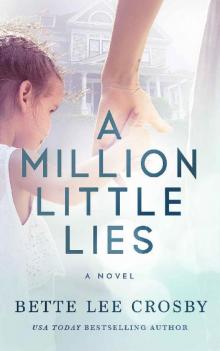 A Million Little Lies
A Million Little Lies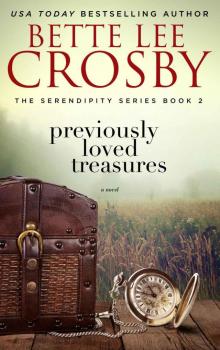 Previously Loved Treasures
Previously Loved Treasures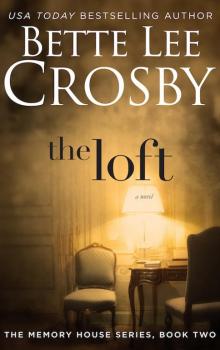 The Loft
The Loft Spare Change
Spare Change Memory House: Memory House Collection (Memory House Series Book 1)
Memory House: Memory House Collection (Memory House Series Book 1)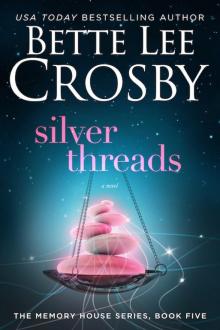 Silver Threads
Silver Threads Wishing for Wonderful: The Serendipity Series, Book 3
Wishing for Wonderful: The Serendipity Series, Book 3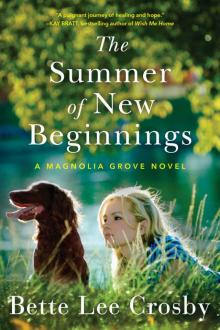 The Summer of New Beginnings: A Magnolia Grove Novel
The Summer of New Beginnings: A Magnolia Grove Novel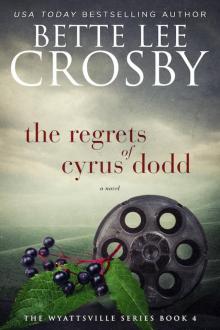 The Regrets of Cyrus Dodd
The Regrets of Cyrus Dodd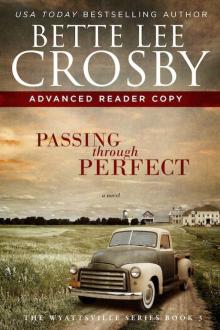 Passing Through Perfect
Passing Through Perfect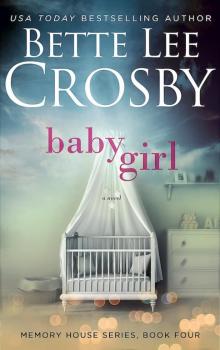 Baby Girl
Baby Girl Jubilee's Journey
Jubilee's Journey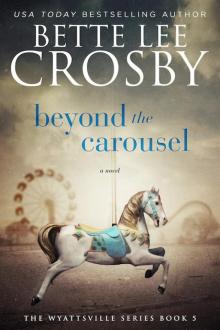 Beyond the Carousel
Beyond the Carousel What the Heart Remembers
What the Heart Remembers Cupid's Christmas
Cupid's Christmas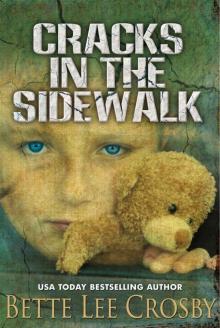 Cracks in the Sidewalk
Cracks in the Sidewalk Blueberry Hill
Blueberry Hill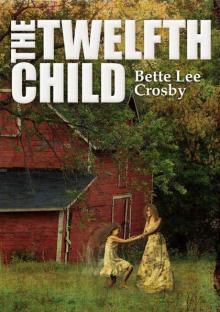 The Twelfth Child
The Twelfth Child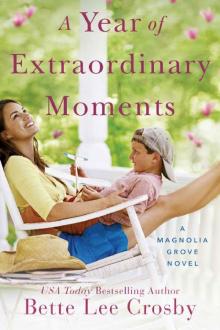 A Year of Extraordinary Moments (A Magnolia Grove Novel)
A Year of Extraordinary Moments (A Magnolia Grove Novel)